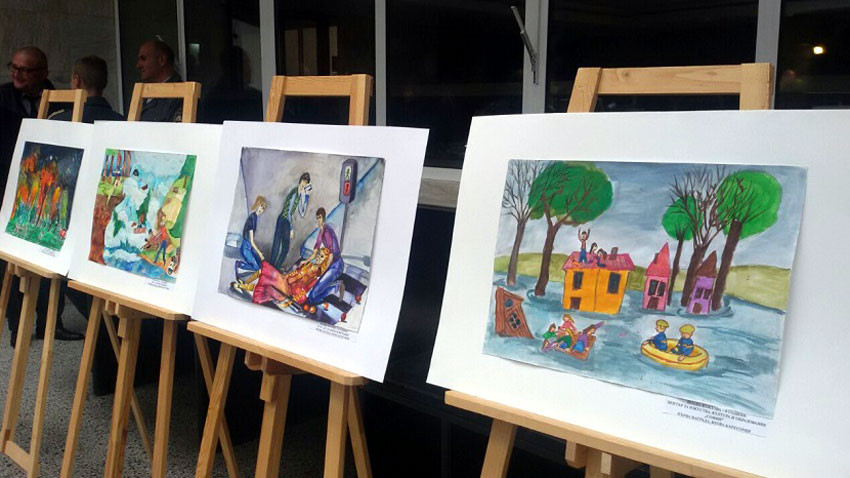In 2018 the number of refugees in the world reached 25.9 million – reads the Global Trends report of the UNHCR, the UN Refugee Agency.
Figures for Bulgaria show that last year 2,536 people have sought protection in this country, for April this figure stands at 416. But beyond numbers are the lives, destinies and dreams of human beings.
“Fears are rampant in Bulgarian society which give rise to all kinds of stereotypes and even myths about refugees,” says Borislav Grozdanov from the UN Refugee Agency in Bulgaria. “Every year we conduct a representative survey to find out what the attitudes are in Bulgarian society to refugees and people seeking protection. Based on the 2018 survey I can say that one of the principal fears is connected with crime and terrorism even though there is not a single instance, in the past 5 years, of a refugee having been connected with any such act in Bulgaria.”
What are the challenges refugees face and what is being done to make their adaptation easier?
“Every person seeking protection is faced with the challenge of not knowing the language or the system in the country. We are targeting our efforts at helping them adapt, we have made films translated into all of the languages they use, its culture and the procedure they have to go through, we have provided Bulgarian language courses,” explains Yanita Manolova, director of “Social activities and adaptation” directorate at the State Agency for Refugees with the Council of Ministers. “The procedure is 3-6 months long. After the third month they are issued a document they can use to be recruited on the labour market. We tell them what options they have depending on their competences, education, professional experience and their desire to work in one sphere or another.”

Children are a priority in the work of the State Agency for Refugees. “It is extremely important to us that the children know the Bulgarian language and that they are given an education,” Yanita Manolova says. There are special rooms at the Agency centres, where children can talk about what worries them or about what they want, “safe zones” where they can meet with psychologists, pedagogues and social workers round the clock.
“We work together with other departments and NGOs. Every year we take part in the competition “I saw the disaster with my own eyes” of the Sofia fire department, we have signed agreements with the St. Kliment Ohridski University, Sofia and with New Bulgarian University. Refugees are people fleeing from armed conflicts or looking for a better life for some other reason. And we do what we can to offer them our hospitality and show them tolerance,” Yanita Manolova says.

“It is our mission to mark this day and to demonstrate empathy with the people in need, to articulate our respect for their courage to leave their homes and venture into the unknown. It is not a day for celebrating, because we cannot celebrate the fact that there are refugees in the world,” says Martina Raychinova from Caritas. “What we want to do today is show up the courage of children at that difficult time for them, to make them feel proud of what they have achieved. We have made several videos showing the stories of people who are already integrated here, in Bulgaria.”
The UN Refugee Agency has lined up various interesting events.
“We are launching a campaign presenting information and trivia connected with refugees,” Borislav Grozdanov says. “We are officially opening an interactive photo exhibition by Nikolay Stoyanov and Fanny Bachvarova called “Identity” presenting the stories of 10 refugees and people seeking protection from Syria, Iraq, Afghanistan, Iran and Mali. Thanks to a mobile application the photographs come to life in a video-narrative, and the people from the photographs can tell us where they comes from, why they want to stay in Bulgaria, what their dreams and their ambitions are. When you take a good look at their stories, you realize just how many things we have in common with the people fleeing from war and conflict,”

The exhibition will be open to the public from 20 June until 4 July at Rakusri gallery in Sofia, 4, Han Krum St. Admission is free.
Photos: courtesy of the State Agency for Refugees with the Council of Ministers
At the Bulgarian Embassy in London, Prof. Bettany Hughes presented excerpts from the new BBC series - Wonders of Bulgaria. Prof. Bettany Hughes is the author of two episodes of the documentary. Hughes is a historian, writer, author of..
According to the Annual Report on the Health Status of Bulgarian Citizens for 2023, t he main cause of death in Bulgaria is diseases of the cardiovascular system (61.1%), followed by oncological diseases (16.5%) and diseases of the respiratory system..
In the week of St. Andrew’s Day (also known as Bears’ Day or Mechkinden), WWF is drawing attention to six orphaned bear cubs who have been given a second chance at life. The initiative is part of the "Subscribe to Nature" campaign and..
Modernizing critical thinking skills, fact-checking skills and media literacy are essential for society, especially for young people in Bulgaria - the..
"You say you are Bulgarian, but you do not know Bulgarian" – this reproach from officials in Bulgaria has been faced by quite a few by our compatriots..
The survival of millions of people around the world, living in conditions of war, hunger, disease and immense despair, is at stake every day. We often..

+359 2 9336 661
